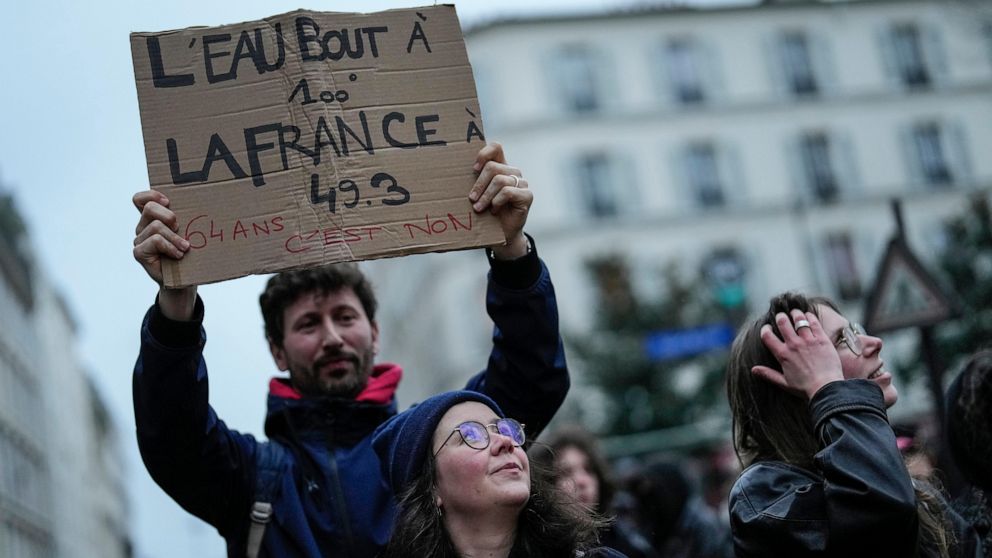PARIS — Large crowds in Paris and other French cities took to the streets in the first mass demonstrations since President Emmanuel Macron inflamed public anger by forcing a higher retirement age bill through parliament without a vote.
Strikes upended travel in France on Thursday as protesters blockaded train stations, Charles de Gaulle Airport in Paris, refineries and ports.
More than 250 protests were organized across the country and union leaders praised the “significant” mobilization.
In Paris, tens of thousands gathered on the Bastille plaza in a cheerful atmosphere, many waving union flags to the sound of standard protest songs as they started walking through the capital. “We are here, even if Macron doesn’t want it, we are here!” many chanted.
In the western city of Rennes, scuffles broke out between some participants and police who used water cannons to disperse the crowd.
Interior Minister Gerald Darmanin denounced “unacceptable assaults and damage” at a state building and a police station in Lorient, also in western France. “These actions cannot remain unpunished,” he tweeted.
High-speed and regional trains, the Paris metro and public transportation systems in other major cities were disrupted. About 30% of flights at Paris Orly Airport were canceled.
The Eiffel Tower and the Versailles Palace were closed Thursday due to the strikes.
Protesters staged blockades on major highways and interchanges to slow traffic around big cities.
Thursday’s events were the ninth round of nationwide demonstrations and strikes called by France’s eight main unions since January. Violence has intensified in recent days at small, scattered protests against the pension reform and Macron’s leadership — in contrast with the largely peaceful big demonstrations staged by unions until then.
Social unrest in France is also tarnishing the sheen of King Charles III’s first overseas trip as monarch, scheduled next week, with striking workers refusing to provide red carpets and un collected garbage piling up in Paris streets.
The French leader is stubbornly resisting the discontent on the streets, and said Wednesday that the government’s bill to raise the retirement age from 62 to 64 must be implemented by the end of the year.
Critics attacked Macron for the statement, describing him as “self-satisfied,” “out of touch” and “offensive.”
The leader of the CGT union Philippe Martinez said Macron “threw a gas tank on the fire.”
At Paris’ Gare de Lyon train station, several hundred strikers walked on the railway tracks to prevent trains from moving, brandishing flares and chanting “and we will go, and we will go until withdrawal” and “Macron, go away.”
“This year perhaps maybe our holidays won’t be so great,” said Maxime Monin, 46, who stressed that employees like him, who work in public transport, are not paid on strike days. “But I think it’s worth the sacrifice.”
Fabien Villedieu, a unionist with SUD-rail, said the strike at France’s railway company SNCF is open-ended. “There are actions every day everywhere, in all the small and big cities of France, with one, two, three or four protests. One, two, three or four blockades,” he said. “What do we need to do to make the government listen?”
In the northern suburbs of Paris, several dozen union members blocked a bus depot in Pantin, preventing about 200 vehicles from getting out during rush hour.
Nadia Belhoum, a 48-year-old bus driver participating in the action, criticized Macron’s decision to force the higher retirement age through.
“The president of the Republic … is not a king, and he should listen to his people,” she said.
The Education Ministry said in a statement that about 24% of teachers have walked off the job in primary and middle schools, and 15% in high schools.
The French government invoked a constitutional provision last week to get the pension bill adopted without the approval of lawmakers. The bill must now pass a review by France’s Constitutional Council before becoming law.
Macron’s government survived two no-confidence votes in the lower chamber of parliament on Monday.
The 45-year-old centrist president, who is in his second and final term, repeatedly said he was convinced that France’s retirement system needed to be modified to keep it financed. Opponents proposed other solutions, including higher taxes on the wealthy or companies, which Macron says would hurt the economy.
_____
AP Journalists Masha Macpherson, Jeffrey Schaeffer and Nicolas Garriga in Paris contributed to the story.

